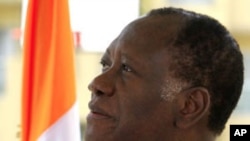The internationally-recognized winner of Ivory Coast's presidential election says military force may now be needed to remove the incumbent government. The international community is considering additional sanctions that the incumbent government says will hurt foreign businesses more than Ivory Coast.
The incumbent government of Laurent Gbagbo no longer recognizes the African Union mediation of Kenyan Prime Minister Raila Odinga because it says he is siding with the internationally-recognized winner of November's vote, former Prime Minister Alassane Ouattara. Diplomatic options to this crisis appear to be closing as West African military leaders consider a regional intervention force to remove Mr. Gbagbo.
Mr. Ouattara says it now appears that force may be necessary.
Mr. Ouattara says it is lamentable that after all these mediations, everyone realizes that the only solution is to make Mr. Gbagbo leave with other measures, including what he calls legitimate force.
Mr. Odinga says Mr. Gbabgo is running out of choices.
"I think President Gbagbo is seeing that the noose is closing, that the options are actually reducing and that he has no other chance but to negotiate a safe exit,” Odinga said. “I told him as much that this is a chance he has to take. We could guarantee him some security, either in retirement, or he will be able to engage in politics in Cote d'Ivoire or in exile."
Mr. Odinga says there will likely be further sanctions against the Gbagbo government if it refuses to yield power to Mr. Ouattara.
The European Union has already frozen the assets of Ivory Coast's main cocoa ports, its state oil firm, its main energy utility, its national broadcaster, and three banks because European leaders say those firms help fund what they call an illegitimate government.
Mr. Gbagbo's government says European businesses have far more to lose from those sanctions than Ivorians.
The managing director of Abidjan's port, Marcel Gossio, says sanctions are irresponsible because the port has nothing to do with elections.
Gossio says sanctions against the port of Abidjan mean freezing port accounts in Europe. But those accounts are there to pay European contractors, so he says he will not pay them and that will be that. Gossio says it is the decision of European governments that Ivory Coast will stop working with European contractors. They are not the only ones in the world, he says.
Mr. Ouattara says sanctions must be properly targeted against Mr. Gbagbo and his government so as not to affect Ivorian citizens, many of whom are still struggling in an economy hurt by a brief civil war and the political divisions that have followed.
Mr. Ouattara says the economic measures he supports should target those who are responsible for the situation: Mr. Gbagbo, his government, his entourage and the soldiers who support him.
Once Mr. Gbagbo leaves power, Mr. Ouattara says he will move quickly to repair the damage to Ivory Coast's economy.
Mr. Ouattara says when Mr. Gbagbo is no longer in power, which he hopes will be very soon, Ivory Coast will renew its ties with the international banking world, multilateral donors and the African Development Bank.
The United Nations is sending 2,000 more peacekeepers to Ivory Coast, raising that force to nearly 12,000 after Mr. Gbagbo called for the withdrawal of the entire mission because he says it is no longer neutral in the conflict.
Ivory Coast's military says soldiers will now stop and search all U.N. vehicles, further raising tensions in a situation where U.N. Secretary-General Ban Ki-moon says violence against U.N. personnel are crimes under international law.




